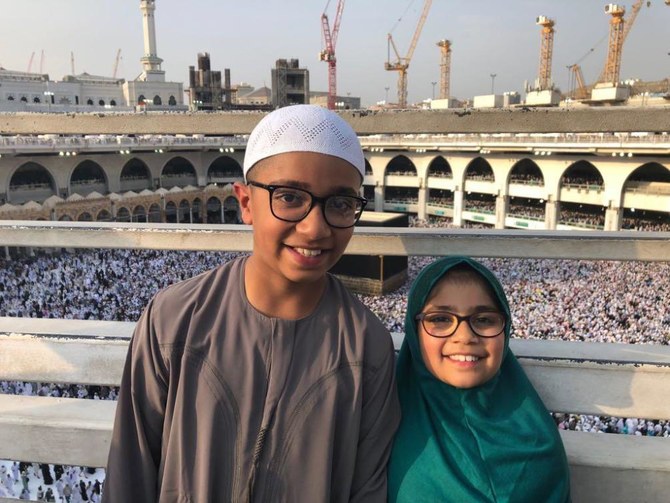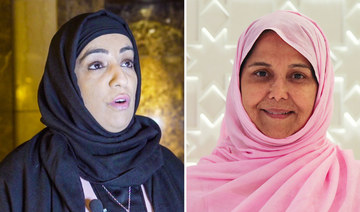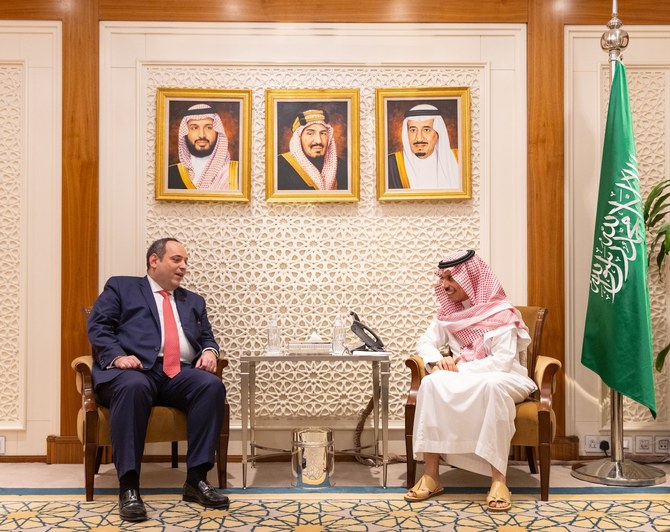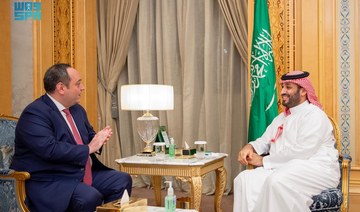LONDON: When Hajj fell during the school holidays in Britain last year, many Muslim pilgrims left their children behind in the care of close relatives.
Given the high cost of Hajj packages from the UK, and knowing their absence would not affect their children’s academic performance, leaving the youngsters behind seemed the best option for most parents.
One brave couple, however, decided to take their children with them — and it is a decision that they do not regret.
Shaheen Doctor, 43, said that initially she wanted to leave her children with family members so that she could concentrate on her own Hajj. However, her husband Ashfaq, 50, did not want to be a burden on relatives, and so they decided to take Abdullah, 12, and Aaminah, 9, along as well.
“I have an aunt and cousin sister who live in Leicester and they offered to look after the children while we performed Hajj,” said Shaheen, who lives in Hackney, east London. “But my husband didn’t want to leave the kids behind and my kids didn’t want to be away from their dad.”

For Hajj to be fulfilled, the pilgrim must have reached puberty. Children can perform the pilgrimage, but they will have to complete another after they reach adulthood to properly fulfil the fifth pillar of Islam. This is another reason why many British parents decide to leave their children with grandparents, aunts or uncles.
Taking the children with them during the five-day annual pilgrimage to Makkah had both positives and down sides for the Doctors.
For a start there was the additional expense, with Hajj packages in the UK costing between £5,000 and £11,000 depending on the level of services required. In addition, the parents sometimes had to adjust their own plans for the good of the children.
“Having the kids with me meant that I was not able to do as much voluntary worship as I would have liked because I was constantly tending to the children’s needs and ensuring that they were well,” said Shaheen. “I feel a bit down about that but I am glad that the kids got to experience Hajj and I hope that I will be able to go again.
“Each part of Hajj was enjoyable for me and the whole experience was really good.”
***********************************************
Top tips for taking the kids on Hajj
Hydrate, hydrate, hydrate!
Dress children in long sleeved clothes made of thin cotton
Make sure they wear hats or caps
Make sure they eat high-energy meals
Give them plenty of fruit and liquids throughout the day
**************************************************
Shaheen works as a nurse at a London hospital and so was well-equipped to ensure her children were able to deal with high temperatures exceeding 40 degrees Celsius (104 degrees Fahrenheit) and the long walks that some of the rituals necessitated.
“I kept an eye on how hydrated they were and I made sure that they kept on drinking,” Shaheen said. “Even though they didn’t like the taste of Lucozade tablets, I kept giving them to my kids to ensure that they maintained water balance.
“I also used to sprinkle water on their heads. If they started getting loose stools, I would only let them eat fruit and made sure they drank lots of liquids to prevent full-on diarrhea. I was constantly monitoring what they consumed.”

She recommends a “high-energy diet rather than a high-calorie one. I made sure the kids had boiled eggs, cereal and milk for breakfast. If they didn’t eat during the day, I didn’t worry. Most of the time they consumed liquids and fruit with high water content during the day.”
Shaheen also ensured that Abdullah and Aaminah wore caps so that their heads were not exposed to direct heat, and long-sleeved clothing made of thin cotton. She added that she was particularly careful about transitioning between air-conditioned and non-air-conditioned environments.
“I used to make them sit in the lobby of the hotel when entering from the heat as this area was not fully air-conditioned like the rooms were,” said Shaheen. “You are bound to get flu and colds if you expose yourself to low temperatures straight after being exposed to high temperatures.”
At some points during the five days of Hajj, pilgrims remain in tented areas where they worship and rest, and the toilets and showers are situated in separate areas.
Shaheen said that going to the toilet during the main days of Hajj “was challenging as I had Aaminah with me, but the people around me were very understanding and used to look after her while I was outside the tent.”
Another challenge the family faced was the 6 kilometer walk from Mina to Makkah that pilgrims complete after stoning the devil for the last time on the fifth day of Hajj. It is a walk that both young and old pilgrims can struggle with.
“It was quite stressful as I was worried about the kids getting tired and whether they would manage the walk; it took two-and-a-half hours,” she said. “My husband made it fun for the kids by playing football with bottle lids that people had discarded on the floor.”

Aaminah, who was 8 at the time, said that the walk was very difficult “because it was very far and the weather was really hot. I managed to get through the walk by thinking about how cool it was in London.”
Her brother, Abdullah, also said that the walk was “really hard because of the heat,” and that he was frightened by the crowds at Jamarat just before the walk.
However, both children said that their experience of Hajj was a positive one and they would do it again.
“I prayed that God would keep me safe throughout the journey and that he would bring me back to see the Kaaba in the future,” said Abdullah.





























